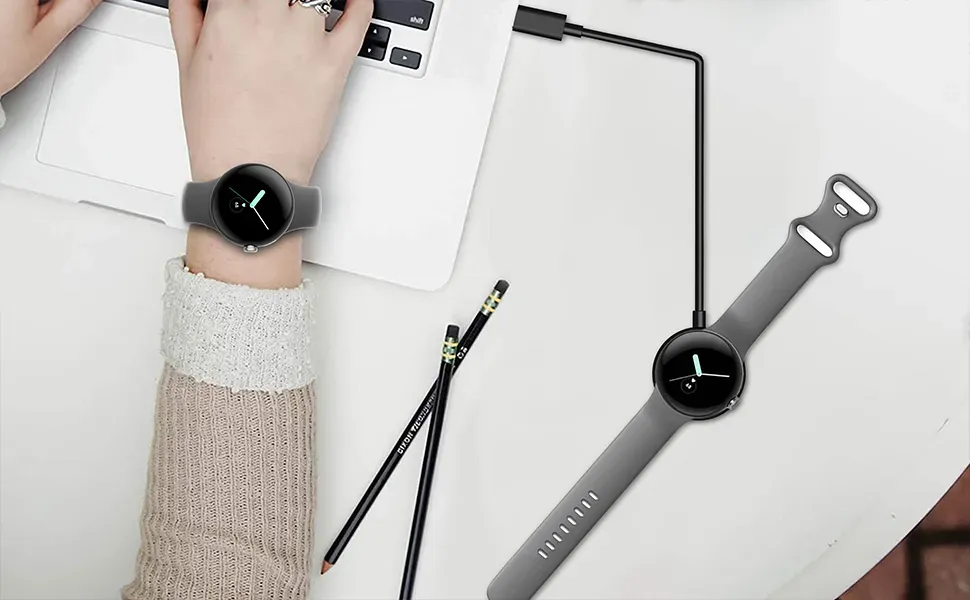The Adaptive Charging Pixel Watch is set to revolutionize how we think about wearable technology and battery management. With the introduction of this innovative Pixel Watch battery feature, users can look forward to enhanced battery health preservation, a crucial aspect for daily wearables. Google Adaptive Charging is designed to learn your charging routine, ensuring your Pixel Watch charges efficiently without overloading the battery. Especially with the Pixel Watch 3 upgrade, this feature embodies a significant step towards sustainable tech, promoting longevity in battery life. As we anticipate its rollout, it’s clear that Adaptive Charging will not only improve user experience but also align the Pixel Watch with other leading smartwatches in the market.
The forthcoming feature known as Adaptive Charging for the Pixel Watch promises to enhance the device’s battery performance significantly. This cutting-edge functionality aims to optimize charging habits, making it a standout characteristic among the latest smartwatch offerings. Users can expect a more intelligent charging experience that aligns with their daily routine, much like the advancements seen in previous Pixel devices. By focusing on battery health preservation, this feature could redefine how we interact with our wearable technology. As the Pixel Watch 3 introduces these innovations, it positions itself as a formidable player in the smartwatch landscape.
Understanding Adaptive Charging for Pixel Watch
Adaptive Charging is a revolutionary feature designed to enhance the battery longevity of devices like the Pixel Watch. It intelligently learns the user’s charging habits, allowing the device to optimize its charging routine effectively. By preventing the battery from reaching 100% until just before the user typically unplugs it, this feature aims to mitigate the detrimental effects of prolonged charging. This is particularly important for wearable devices that are often charged multiple times throughout the day, as it helps maintain battery health over extended periods.
The introduction of Adaptive Charging to the Pixel Watch signifies Google’s commitment to improving user experience through innovative battery management solutions. Similar to its implementation in Pixel smartphones, this feature could potentially transform how users interact with their devices. By adapting to individual charging schedules, the Pixel Watch can ensure that the battery remains in optimal condition, extending its overall lifespan and ensuring that users get the most out of their investment.
The Benefits of Battery Health Preservation
Battery health preservation is a critical consideration for modern devices, especially wearables like the Pixel Watch. As these devices are designed for daily use, their batteries often undergo significant wear and tear over time. By integrating features like Adaptive Charging, Google can help users avoid the pitfalls of overcharging, which can lead to reduced battery capacity and performance. This proactive approach not only enhances user satisfaction but also aligns with the growing trend of sustainability in technology.
Moreover, focusing on battery health preservation is not just about extending battery life; it also reflects a broader understanding of consumer needs. Users are increasingly seeking devices that can adapt to their lifestyles while minimizing the hassle of frequent charging. With the anticipated rollout of Adaptive Charging, Pixel Watch users can enjoy a more seamless experience, knowing that their device is working intelligently to support their daily routines without compromising battery performance.
Pixel Watch 3 Upgrade: What to Expect
The Pixel Watch 3 represents a significant upgrade in Google’s smartwatch lineup, particularly in terms of battery performance and features. While the watch boasts a commendable battery life of up to 24 hours, the introduction of Adaptive Charging could further enhance this experience. Users can expect their devices to not only charge faster but also to maintain battery health effectively over time. This is especially relevant for users who rely on their watches for sleep tracking, as the need for daily or even multiple charges becomes a reality.
As Google rolls out updates for the Pixel Watch 3, the anticipation surrounding Adaptive Charging highlights the brand’s commitment to competing in the rapidly evolving smartwatch market. Users are eager to see how this feature will integrate with their existing charging habits and how it can prolong the life of their devices. With the Pixel Watch 3 already showing impressive charging capabilities, the addition of Adaptive Charging could solidify its position as a leading option for smartwatch consumers.
Google Adaptive Charging: A Game Changer for Wearables
Google Adaptive Charging has the potential to be a game changer for wearables like the Pixel Watch. By monitoring and learning from user charging habits, this feature can optimize the charging process to prevent battery degradation. This is particularly crucial for devices that are often charged multiple times throughout the day, as it ensures that users can rely on their watches without worrying about battery health. As more consumers seek devices that are not only functional but also sustainable, Adaptive Charging aligns perfectly with these expectations.
This innovative approach to battery management mirrors similar features found in other tech ecosystems, such as Apple’s Optimized Battery Charging. By adopting similar technology, Google is not only enhancing the functionality of the Pixel Watch but also ensuring that it remains competitive in a crowded market. The upcoming implementation of Adaptive Charging could be a key differentiator for Pixel Watch users, providing them with a superior charging experience.
How Charging Routine Influences Battery Lifespan
A user’s charging routine plays a pivotal role in determining the lifespan of their device’s battery. Frequent overcharging can lead to a decrease in battery capacity over time, making it essential for users to adopt best practices for charging. With the introduction of Adaptive Charging, the Pixel Watch could help users establish a healthier charging routine. By learning when users typically unplug their devices, it can intelligently manage charging to ensure that the battery is not subjected to detrimental charging conditions.
Moreover, understanding the influence of charging routines allows users to make informed decisions about how and when they charge their devices. The Pixel Watch’s potential ability to adapt to these routines could encourage users to embrace more sustainable charging habits. As a result, this could lead to longer-lasting batteries and improved overall performance, ultimately enhancing the user experience.
The Future of Smartwatch Battery Technology
The future of smartwatch battery technology is bright, particularly with innovations like Adaptive Charging on the horizon for the Pixel Watch. As consumers continue to demand more from their wearable devices, manufacturers are focusing on developing smarter battery management systems that prioritize longevity and efficiency. With smart features that learn from user behavior, future smartwatches could redefine how we think about charging and battery care, ensuring users have reliable devices that stand the test of time.
As Google prepares to implement Adaptive Charging in its Pixel Watch lineup, it sets a precedent for other manufacturers in the industry. The emphasis on battery health preservation and intelligent charging solutions is likely to influence future smartwatch designs and functionalities. This shift towards more adaptive technology not only enhances user experience but also aligns with the growing emphasis on sustainability in technology, paving the way for smarter and more eco-friendly devices.
Why Adaptive Charging Matters for Daily Users
For daily users of the Pixel Watch, Adaptive Charging is more than just a convenience; it is a necessary feature that addresses common pain points associated with battery management. Many users rely on their smartwatches for tracking daily activities, health metrics, and notifications, making battery life a critical concern. Adaptive Charging helps mitigate the stress of battery depletion by ensuring that the watch is charged effectively without the risk of overcharging.
Additionally, the importance of Adaptive Charging extends beyond mere battery management; it reflects a deeper understanding of consumer needs for reliability and efficiency. As users increasingly depend on their devices for various functions, having a smartwatch that autonomously manages its charging routine can significantly enhance the overall user experience. This proactive approach to battery health ensures that users can focus on their daily tasks without the constant worry of charging interruptions.
Comparing Pixel Watch with Other Smartwatches
When comparing the Pixel Watch to other smartwatches on the market, one of the standout features is its potential implementation of Adaptive Charging. While devices like the Apple Watch have long utilized similar battery management systems, the Pixel Watch aims to catch up with this competitive edge. By learning from user charging habits, it promises to provide a more tailored experience that could resonate well with consumers who prioritize battery health.
Furthermore, the Pixel Watch 3’s charging capabilities, alongside the anticipated addition of Adaptive Charging, position it as a strong contender in the smartwatch market. Users are increasingly looking for devices that not only offer advanced features but also ensure longevity through intelligent battery management. As Google continues to innovate in this space, the Pixel Watch may very well redefine the standards for smartwatch performance and usability.
The Role of Software Updates in Battery Management
Software updates play a crucial role in enhancing battery management features like Adaptive Charging in the Pixel Watch. With regular updates, Google can refine the algorithms that learn from user behavior and optimize charging routines effectively. This not only ensures that users benefit from the latest advancements but also helps maintain device performance over time. In a rapidly evolving tech landscape, staying updated is essential for maximizing the capabilities of wearable devices.
Moreover, the role of software updates goes beyond just adding new features; they also address existing issues related to battery performance. As users report feedback on their experiences, manufacturers like Google can make necessary adjustments to improve battery health preservation strategies. This ongoing commitment to enhancing battery management through software updates demonstrates the importance of a responsive and adaptive approach in the smartwatch industry.
Frequently Asked Questions
What is Adaptive Charging on the Pixel Watch?
Adaptive Charging is a feature being introduced for the Pixel Watch that helps prevent overcharging by learning your charging routine. Similar to Google Adaptive Charging on Pixel phones, it aims to keep the battery health preserved by stopping the charge before reaching 100% until shortly before you typically unplug the device.
How does Google Adaptive Charging improve Pixel Watch battery health?
Google Adaptive Charging enhances Pixel Watch battery health by managing the charging process intelligently. By analyzing your charging habits, it optimizes the charging speed to avoid prolonged periods at full charge, thereby preserving the overall battery lifespan.
Will the Pixel Watch 3 support Adaptive Charging?
Yes, the Pixel Watch 3 is expected to support Adaptive Charging as part of its upgrade. This feature is designed to help improve battery health preservation and align the Pixel Watch with competitive smartwatch offerings.
What is the charging routine for the Pixel Watch with Adaptive Charging?
With Adaptive Charging, the Pixel Watch will learn your typical charging routine. For instance, if you usually charge your watch overnight, it may delay reaching a full 100% until just before you wake up, promoting better battery health.
How long does it take to charge the Pixel Watch 3?
The Pixel Watch 3 charges from 15% to 80% in approximately 20 minutes, but reaching a full 100% can take about an additional 40 minutes. Adaptive Charging may adjust this process to enhance battery longevity.
Is Adaptive Charging available on all Pixel Watch models?
As of now, Adaptive Charging is not live on all Pixel Watch models. It is anticipated to roll out first on the latest models, likely starting with the Pixel Watch 3.
Why is battery health preservation important for the Pixel Watch?
Battery health preservation is crucial for the Pixel Watch as it extends the lifespan of the device’s battery, ensuring optimal performance and longevity. Features like Adaptive Charging are designed specifically to address this concern.
When will Adaptive Charging be available for the Pixel Watch?
Currently, there is no official release date for Adaptive Charging on the Pixel Watch. However, it is expected to be included in future updates, particularly for the Pixel Watch 3.
How can I benefit from Adaptive Charging on my Pixel Watch?
By utilizing Adaptive Charging, you can benefit from improved battery health over time. This feature will help manage how your watch charges based on your habits, ensuring that the battery does not overcharge and degrade too quickly.
What is the difference between Adaptive Charging and the standard charging process for the Pixel Watch?
The main difference is that Adaptive Charging intelligently adjusts the charging speed and timing based on your routine. In contrast, the standard charging process charges the device continuously until it reaches 100%, which can lead to battery wear over time.
| Key Point | Details |
|---|---|
| Introduction of Adaptive Charging | Google’s Adaptive Charging feature prevents overcharging, preserving battery health, and is expected to be implemented in the Pixel Watch. |
| Recent Updates Suggesting Feature | The latest Pixel Watch Management Service update indicates potential for Adaptive Charging, though it is not yet live. |
| Functionality Similar to Smartphones | Adaptive Charging is expected to learn user charging routines, similar to how it functions on Pixel smartphones and Apple’s Optimized Battery Charging. |
| User Charging Habits | Many users charge their watches multiple times a day, making it difficult to avoid reaching 100% for optimal health. |
| Expected Benefits | While it may not extend daily usage time, Adaptive Charging could enhance long-term battery health. |
| Future Updates | No official release date is provided, but the Pixel Watch 3 is likely to receive this feature first. |
Summary
The Adaptive Charging Pixel Watch is poised to be an exciting advancement for users seeking to extend their device’s battery lifespan. By preventing overcharging through intelligent charging routines, this feature aims to enhance battery longevity, similar to existing technologies in smartphones and other wearables. While some users may find it challenging to adapt to reduced charging levels, the long-term benefits for battery health could be significant. As Google continues to roll out updates, the Adaptive Charging feature could bring the Pixel Watch in line with competitors, offering a more seamless and efficient charging experience.










